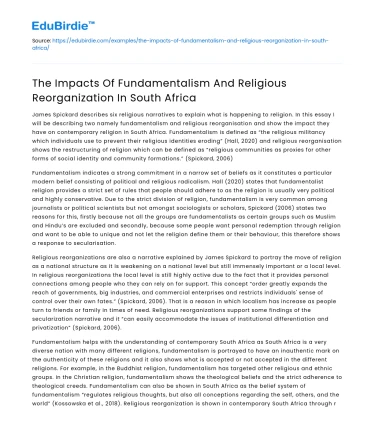James Spickard describes six religious narratives to explain what is happening to religion. In this essay I will be describing two namely fundamentalism and religious reorganisation and show the impact they have on contemporary religion in South Africa. Fundamentalism is defined as “the religious militancy which individuals use to prevent their religious identities eroding” (Hall, 2020) and religious reorganisation shows the restructuring of religion which can be defined as “religious communities as proxies for other forms of social identity and community formations.” (Spickard, 2006)
Fundamentalism indicates a strong commitment in a narrow set of beliefs as it constitutes a particular modern belief consisting of political and religious radicalism. Hall (2020) states that fundamentalist religion provides a strict set of rules that people should adhere to as the religion is usually very political and highly conservative. Due to the strict division of religion, fundamentalism is very common among journalists or political scientists but not amongst sociologists or scholars, Spickard (2006) states two reasons for this, firstly because not all the groups are fundamentalists as certain groups such as Muslim and Hindu’s are excluded and secondly, because some people want personal redemption through religion and want to be able to unique and not let the religion define them or their behaviour, this therefore shows a response to secularisation.
Save your time!
We can take care of your essay
- Proper editing and formatting
- Free revision, title page, and bibliography
- Flexible prices and money-back guarantee
Religious reorganizations are also a narrative explained by James Spickard to portray the move of religion as a national structure as it is weakening on a national level but still immensely important or a local level. In religious reorganizations the local level is still highly active due to the fact that it provides personal connections among people who they can rely on for support. This concept “order greatly expands the reach of governments, big industries, and commercial enterprises and restricts individuals' sense of control over their own fates.” (Spickard, 2006). That is a reason in which localism has increase as people turn to friends or family in times of need. Religious reorganizations support some findings of the secularization narrative and it “can easily accommodate the issues of institutional differentiation and privatization” (Spickard, 2006).
Fundamentalism helps with the understanding of contemporary South Africa as South Africa is a very diverse nation with many different religions, fundamentalism is portrayed to have an inauthentic mark on the authenticity of these religions and it also shows what is accepted or not accepted in the different religions. For example, in the Buddhist religion, fundamentalism has targeted other religious and ethnic groups. In the Christian religion, fundamentalism shows the theological beliefs and the strict adherence to theological creeds. Fundamentalism can also be shown in South Africa as the belief system of fundamentalism “regulates religious thoughts, but also all conceptions regarding the self, others, and the world” (Kossowska et al., 2018). Religious reorganization is shown in contemporary South Africa through religious localism which is portrayed as religious congregations is alongside family to offer support to individuals who may need it. It also shows the growth of local levels of reorganizations in South Africa as it allows more personal connections in which people can turn to family and friends and return to localism in times of need.
To conclude, Fundamentalism is very political and shows a set belief in religions and religious reorganisations show how local is becoming more important. Both these narratives play a role in contemporary South Africa as fundamentalism so the authenticity of religion and what is seen as right or wrong, while religious reorganisation shows how localism is increasing in South Africa as people make better personal relationships and tend to turn to these people in times of need.






 Stuck on your essay?
Stuck on your essay?

